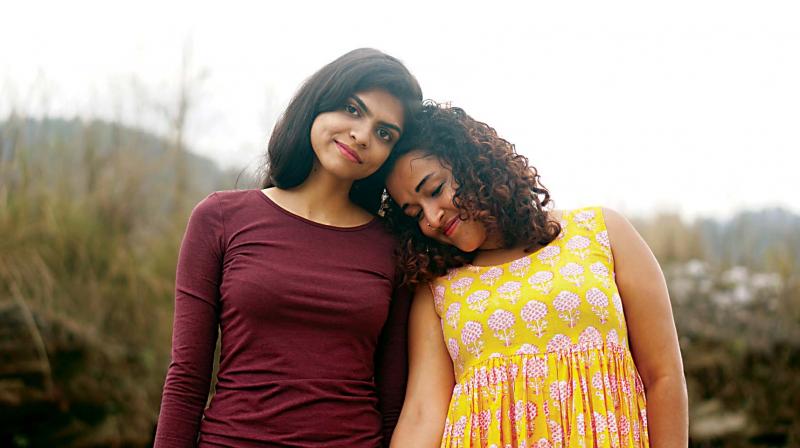Spoken Word on Female Friends
Two theatrical poets put a spin to what female friendships are all about.

Can women be friends? Performers, theatrical poets and spoken word artists Karunya Srinivasan and Nupur Saraswat bring together twelve real life stories of friendships shared by women who wrote to them from across the world. Their theatrical poetry show Girls Just Wanna have Friends showcases what they term as ‘friendship in pre-woke era’. Saraswat points out that these stories consist of the good, bad, ugly, nasty, amazing and real friendships in one’s life. Saraswat is also called the ‘Sanskari Girl’ after she did a show with her first partner Keith two years back called 2 Sanskari Girls. “We were talking a lot of about the definition of a good girl in India. And our aim was to showcase the ideal definition of Sanskari girl in Indian society. Personally, these are the reasons why I do not consider myself as a Sanskari girl. Maybe it’s a little too ironical.”
The Chennai-based Srinivasan, on the other hand, is a dancer, writer, performer and expressive arts therapist using different art forms as tools of expression and healing. Her Samana Art Movement is about engaging deeply with oneself using arts through workshops, classes, performances and conversations. She started writing poetry about five years back when she discovered that “poetry didn’t need to rhyme”.
The stories they plan to say are set to music and movement while a chant runs through the whole performance. Importantly, Srinivasan explains, they are looking at deconstructing the stereotypes of female friendships and uncovering the layers and complexities that exist within them. “We’re addressing jealousy and anger which often exist in friendships but aren’t given space.”
For this show, the duo has collaborated from different cities, speaking about the structure, concepts and the ideas over the phone putting together the recordings and music in Chennai a few days before the first show. They also speak of practising a lot, especially because they are not constantly in the same place. Like in any partnership, their individual strengths have been packaged to bring in synergy. “I essentially work as a storyteller and spoken word artist and Karunya is anexpressive artist,” Saraswat says. “We both work together to bring a dynamic and pleasant taste on the stage while performing.” The two agree that they were open enough to address things, looking up to each other and seeing how each other’s strengths complement rather than minimise them. “It also involved a lot of trust,” Srinivasan pipes in.
We now talk about ‘post woke’ feminism. Talking of the period of heightened awareness of social injustice and women rights, Saraswat, who moved to India from Singapore just four months back, calls post woke feminism as one of the hardest one in the country in Asia. “So, this era has raised a lot of discussions that speaks about gender equality. To define the pre-woke era and post-woke era depends upon the upbringing of an individual. We just go with the flow of listening to other people’s thoughts and never rethink about it justify the issue. In my opinion, people have nasty friends when they do not support and listen to each other’s problems and stand by them. Instead of supporting and boosting woman's confidence, every other day they provoke and make her feminist.”
The two women vouch for a lot of interaction with their audience that they say is mainly women. Srinivasan muses, “Men are of course invited as spectators, but we’re speaking to women to invite them into this world, this conversation, this introspection. But irrespective of context, I engage with my audience through art (in all its forms) and the special authenticity and vulnerability that are unique to art.” Through these interactions, especially with school and college girls, working women, it is easy to engage and share social messages related to body shaming, body image and other issues. Saraswat too vouches for these sessions. “In every show, we have half-an-hour sessions for intimidating talks essentially for the audience wherein they are free to participate, ask questions and share their views. Till today, I have been experiencing that these sessions play a major role as people participate enthusiastically and exchange their words. I believe that there is a space where we can engage, talk with them and they also get comfortable in sharing their own stories.”
The two are vocal about feminism and how it exists in the country. Calling it feminism only if it is intersectional, they feel that anywhere in the world, especially in India where there are societal divisions, caste and class need to be brought into their narratives. At least, that is the truth for Srinivasan who says that she “still has a LOT of learning - and unlearning - to do and to acknowledge and use my privilege as an upper-caste woman.” Her partner echoes, “In the world like ours where women face numerous challenges or difficulties, we women should stand up together, use our voice to raise these issues in the society.”
These views have since culminated into the show which will bring the focus on the female perspectives of friendship, give a positive spin to emotions like jealousy as well as the endless conversations, laughter and fights integral to such relations. The entire show is then about being inclusive and breaking norms.

